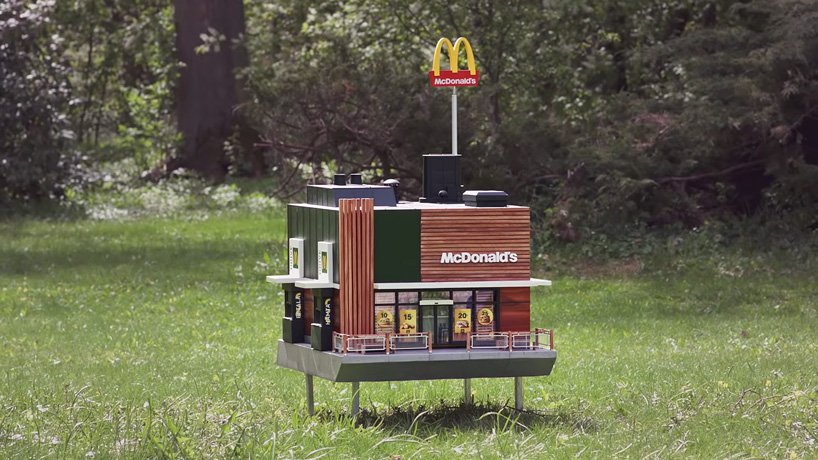How are the world's honey bees doing? Just a few years ago, word spread that they were on the verge of a mysterious extinction. Look for updates on their situation now and you get contradictory results, all of them fairly recent, from "Bees Are Still Dying" to "Bees Are Bouncing Back From Colony Collapse Disorder" to "Yes, the Bees Are Still in Trouble" to "The Bee Apocalypse Was Never Real." But whether they're in existential danger or not, bees at least now have their very own McDonald's — bees in certain parts of Sweden, anyway.
"McDonald’s has created a tiny replica of one of its restaurants, too small for any human to eat there," writes Emily Chudy in the Independent. "The replica, dubbed the 'McHive,' is a fully-functioning beehive designed to look like a McDonald’s restaurant and features seating, a drive-through and an entrance. The brainchild of set designer Nicklas Nilsson, the hive is part of an initiative which has seen beehives placed on certain Swedish branches of the franchise." This project seems to be the first insect-scale restaurant for Nilsson, whose past work includes costume design on the video for David Bowie's "Blackstar."
You can see footage of the McHive's design and assembly process, as well as an assembled McHive full of its "thousands of important guests," in the video at the top of the post. There are more photos at designboom, which quotes the project's advertising agency NORD DDB as saying that "the initiative started out locally but is now growing." In addition to installing beehives on their rooftops, more Swedish McDonald's franchisees "have also started replacing the grass around their restaurants with flowers and plants that are important for the wellbeing of wild bees."

Why so much concern about honey bees in the first place? Chudy quotes a Greenpeace estimate that they "perform about 80% of all pollination and a single bee colony can pollinate 300 million flowers each day." Bees do the hard work of keeping a surprisingly large part of the natural world working as we've always known it to, and to the extent that bees die out, much else may die out as well, with potential knock-on effects many would prefer not to think about. But then, the taste for predictions of ecological disaster on the internet seems only to have grown since we first noticed the problem with bees: if you really want to feel motivated to petition your local McDonald's to put up a McHive, try Googling the phrase "catastrophic collapse of nature."
via designboom
Related Content:
Mesmerizing Timelapse Film Captures the Wonder of Bees Being Born
The Billion-Bug Highway You Can’t See
Based in Seoul, Colin Marshall writes and broadcasts on cities, language, and culture. His projects include the book The Stateless City: a Walk through 21st-Century Los Angeles and the video series The City in Cinema. Follow him on Twitter at @colinmarshall, on Facebook, or on Instagram.
McDonald’s Opens a Tiny Restaurant — and It’s Only for Bees is a post from: Open Culture. Follow us on Facebook, Twitter, and Google Plus, or get our Daily Email. And don't miss our big collections of Free Online Courses, Free Online Movies, Free eBooks, Free Audio Books, Free Foreign Language Lessons, and MOOCs.
from Open Culture http://bit.ly/2KdYgBZ
via Ilumina
Comments
Post a Comment